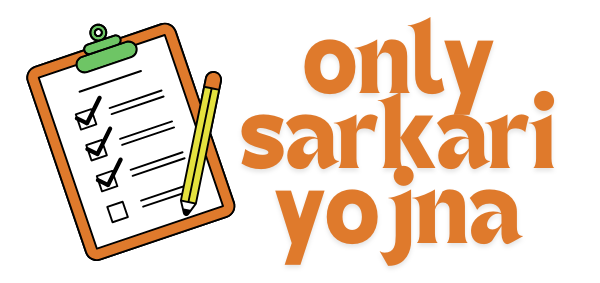Navigating the realm of career choices can be a daunting experience for students. A comprehensive understanding of career guidance is essential, as it plays a crucial role in shaping their futures.
This article examines the concept of career guidance, its significance for students, and the various forms it can take, including individual counseling and group workshops.
Additionally, it outlines the numerous advantages of seeking guidance, how to identify the appropriate counselor, and resources available to support students on their career journeys.
Understanding how to make informed decisions can facilitate the development of a fulfilling career path.
Understanding Career Guidance
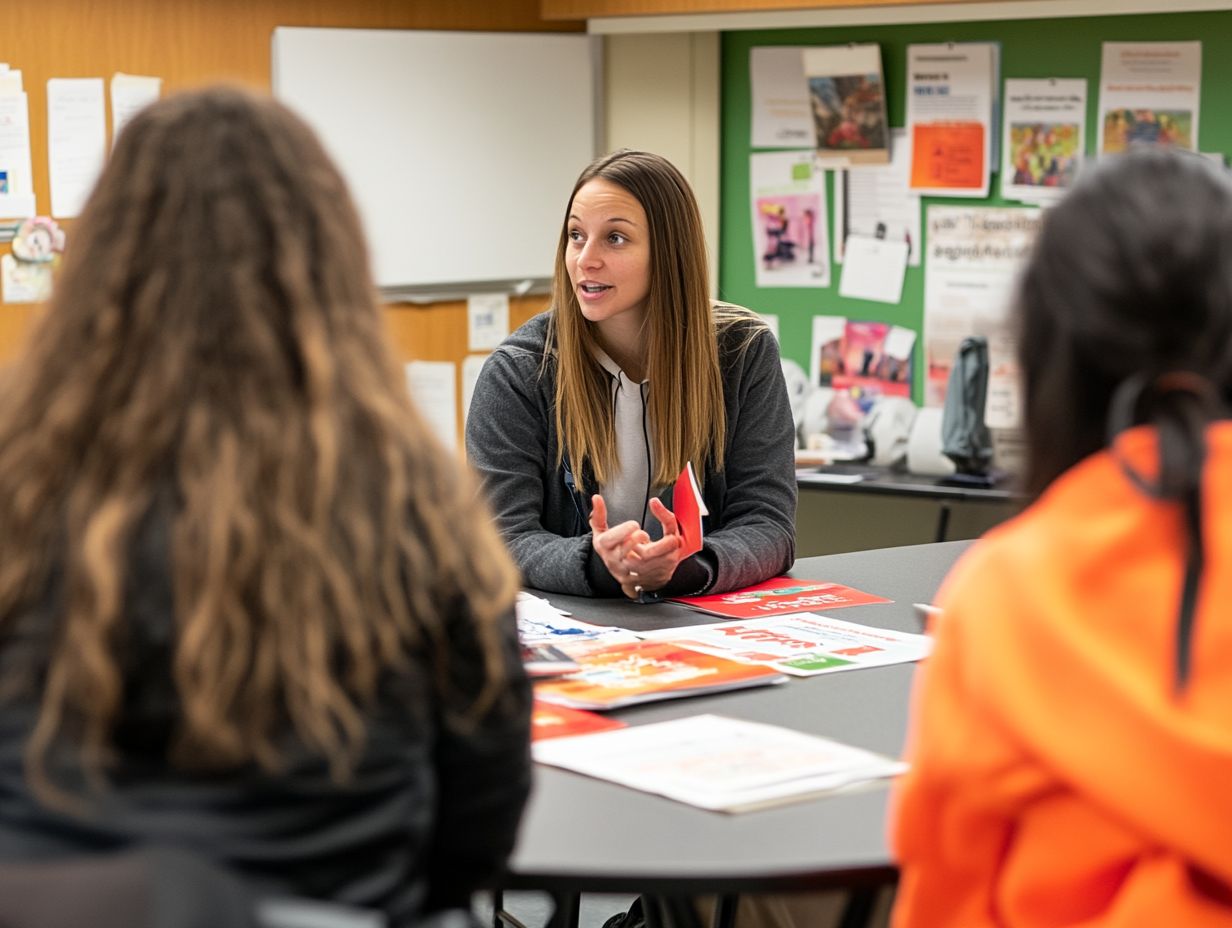
Understanding career guidance is essential for students, as it encompasses a range of services designed to assist individuals in making informed decisions regarding their educational and career trajectories.
Effective career guidance includes career counseling, academic advising, and the administration of career assessments, all of which work together to provide a comprehensive understanding of personal interests, skills, and market dynamics.
By actively participating in career exploration, students can identify viable educational pathways, thereby facilitating successful transitions into the competitive job market.
This holistic approach not only fosters skill development but also ensures that students are adequately prepared for their future endeavors.
What is Career Guidance?
Career guidance is a structured process that aims to provide students with the necessary information, resources, and support to make informed decisions regarding their educational and career trajectories.
This vital support framework encompasses various elements, including career counseling and academic advising, both of which play a crucial role in helping withdividuals in navigating their options.
Career counseling offers tailored guidance that assesses a student’s unique strengths, weaknesses, and aspirations, aligning them with potential career paths. Conversely, academic advising ensures that students select courses and extracurricular activities that are aligned with their career objectives.
To enhance this process, career assessments serve as valuable tools that aid students in identifying their skills and interests, thereby facilitating a deeper understanding of appropriate career options.
Collectively, these components give the power to students with the knowledge and confidence needed to transition effectively into their selected fields.
Importance of Career Guidance for Students
The significance of career guidance for students is paramount, as it provides them with the essential tools necessary to navigate their career exploration effectively and make informed decisions in a rapidly evolving job market.
In the contemporary landscape, characterized by technological advancements and global economic shifts, the necessity for a robust foundation in career guidance becomes increasingly critical. This support system enables students to identify potential career paths, gain a deeper understanding of job market trends, and recognize the skills required for various professions.
For example, a student with an interest in technology may find it beneficial to receive insights into emerging fields such as artificial intelligence or cybersecurity, which are experiencing high demand.
By utilizing resources such as mentorship programs and workshops, students can enhance their knowledge and cultivate connections that may lead to valuable internships or job placements.
Types of Career Guidance
There are several types of career guidance available to meet the diverse needs of students, including individual career counseling, group workshops, and seminars.
Each of these methods provides distinct approaches to career development.
Individual Career Counseling
Individual career counseling offers personalized guidance specifically tailored to the unique needs and aspirations of each student, assisting them in navigating self-assessment and goal-setting processes.
This approach ensures that each individual receives focused attention that aligns with their distinct experiences, skills, and visions for the future. A critical component of this counseling is the self-assessment phase, during which individuals reflect on their interests, strengths, and values to identify career paths that correspond with their personal identity.
Employing various tools and techniques, counselors facilitate this introspective journey, enabling students to uncover hidden potentials and clarify ambiguous career objectives.
Through this thoughtful exploration, they can effectively establish achievable and meaningful career goals that not only inspire progress but also foster long-term satisfaction in their chosen fields.
Group Workshops and Seminars
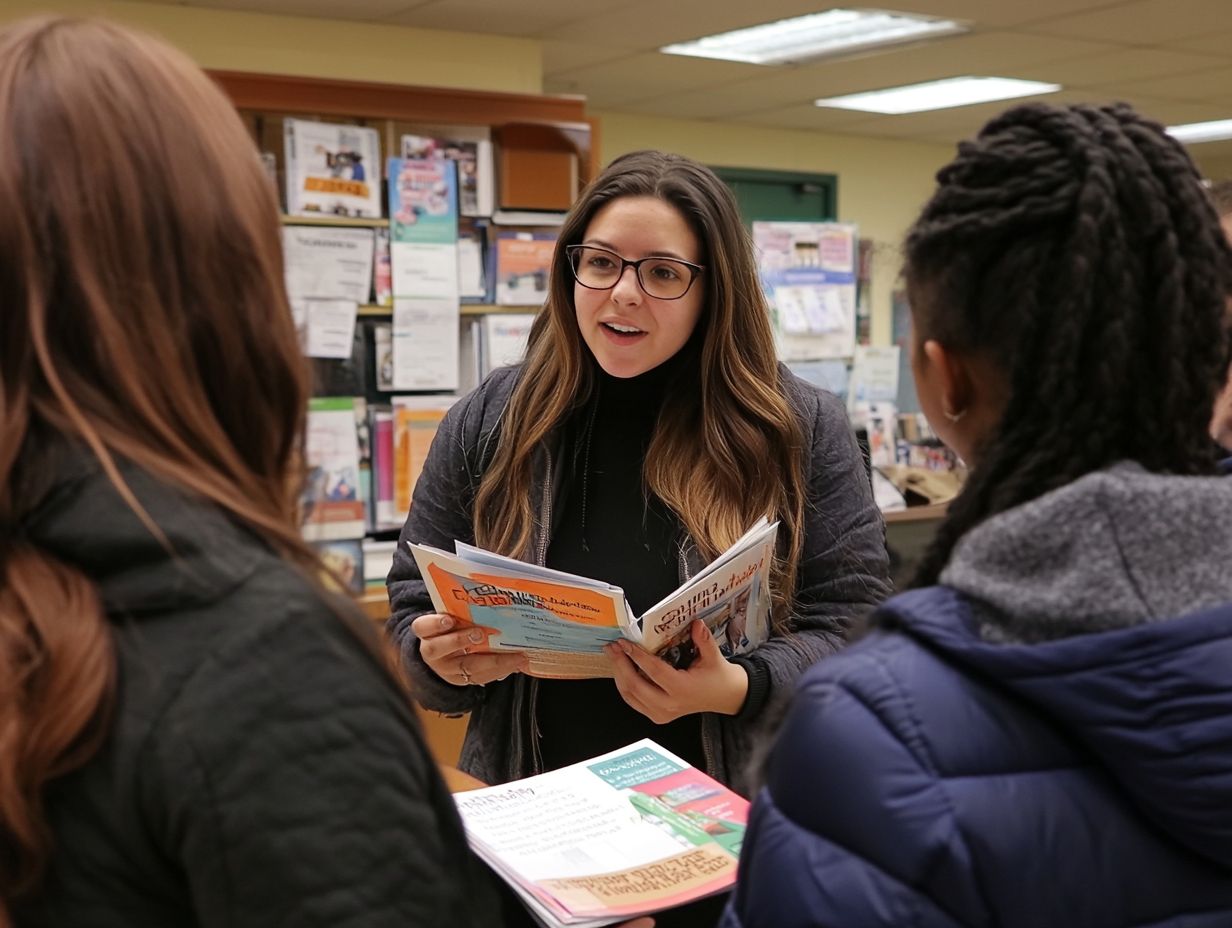
Group workshops and seminars provide valuable collaborative learning experiences, enabling students to interact with their peers and gain insights into various career paths and skill development opportunities.
These interactive sessions cultivate an environment conducive to idea sharing, inquiry, and constructive feedback, rendering the learning process both dynamic and relevant. By collaborating with individuals from diverse backgrounds, students are afforded the opportunity to explore different perspectives that enhance their understanding of potential careers.
This peer interaction not only fosters essential networking skills but also promotes teamwork, which is critical in the professional arena.
Workshops frequently feature industry professionals who share their experiences, assisting students in clarifying their goals and making informed decisions regarding their future paths. Such collective experiences are critical for both personal and professional growth.
Benefits of Career Guidance for Students
The advantages of career guidance for students are extensive, encompassing enhanced self-awareness and decision-making abilities, as well as expanded career opportunities and avenues for professional development.
Improved Self-Awareness and Decision Making
Career guidance significantly enhances students’ self-awareness and decision-making capabilities, enabling them to identify their strengths, weaknesses, and aspirations while exploring various career paths.
This process is essential for their overall personal development, as it promotes reflective thinking and self-evaluation. Through a range of assessments and counseling sessions, individuals gain valuable insights into their preferences and values, which are critical for establishing realistic goals.
By comprehending their distinct attributes, students are better equipped to make informed decisions that align with their passions and future career opportunities.
As they navigate diverse options, this experience fosters resilience and adaptability, give the power toing them to confront challenges with confidence.
Ultimately, effective career guidance acts as a strategic roadmap, assisting young individuals in shaping fulfilling professional trajectories while refining their decision-making skills.
Increased Career Opportunities
One of the primary advantages of career guidance is the enhanced access to career opportunities, as students become better equipped to comprehend employment prospects and align their skills with prevailing job market trends.
This guidance is instrumental in shaping their career trajectories by offering insights into various industries and assisting them in identifying the skills that are currently in demand. By remaining informed about economic factors and the evolution of job requirements, students are give the power toed to make more educated decisions regarding their education and training.
Engaging with career counselors and participating in workshops further improves their ability to navigate the complexities of the job market. Ultimately, this proactive approach not only increases their likelihood of securing employment but also fosters long-term career satisfaction by enabling them to find positions that align with their interests and competencies.
How to Find and Work with a Career Counselor
Engaging with a career counselor necessitates a comprehensive approach to research in order to identify qualified professionals.
It is essential to understand the expectations from career counseling sessions to fully maximize the benefits of professional development.
Researching and Choosing a Career Counselor
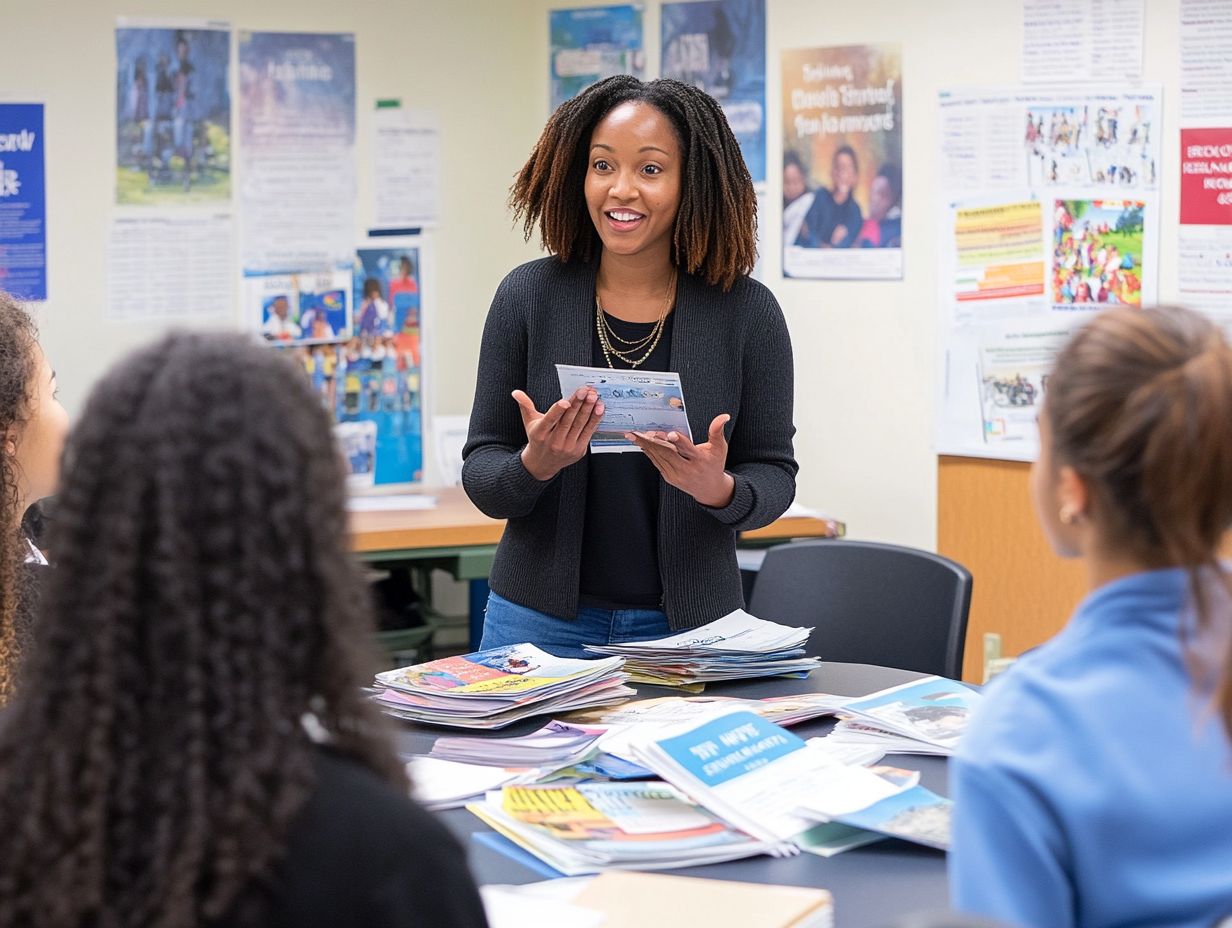
Researching and selecting a career counselor is a crucial step in obtaining effective career guidance. Students should carefully consider the counselor’s qualifications, experience, and counseling approach.
The choice of an appropriate career counselor can significantly influence one’s career trajectory, affecting not only immediate decisions but also long-term professional success.
When assessing potential counselors, it is essential for individuals to investigate their educational background and professional certifications, as these elements often reflect a robust foundation of knowledge. Additionally, examining the counselor’s years of experience within the field can provide valuable insight into their capability to navigate the complexities of various industries.
Along with qualifications and experience, the counselor’s approach to counseling is of utmost importance. Potential clients should seek a counselor whose style aligns with their personal preferences and learning styles, thereby fostering a productive and supportive environment conducive to exploration and growth.
What to Expect from Career Counseling Sessions
Career counseling sessions offer students personalized guidance tailored to their individual needs, facilitating self-assessment and the exploration of viable career paths.
These sessions are structured to assist individuals in identifying their strengths, weaknesses, interests, and values, which are essential components in making informed career decisions. Students can anticipate engaging in a variety of self-assessment activities, including personality tests and skills inventories, which provide valuable insights into their potential compatibility with different professions.
The counseling process promotes open dialogue, allowing students to express their aspirations and concerns while receiving constructive feedback.
Ultimately, career counseling not only equips students with knowledge regarding various career options but also give the power tos them to make decisions that align with their personal goals and lifestyle preferences.
Career Guidance Resources for Students
A variety of career guidance resources are available for students, encompassing online tools and assessments, as well as books and workbooks designed to facilitate knowledge-based decision making regarding their career paths.
Online Tools and Assessments
Online tools and assessments serve as invaluable resources that assist students in gaining insights into their interests, strengths, and potential career paths throughout their career guidance journey.
These platforms provide interactive quizzes, personality tests, and skills assessments that enable students to explore their unique profiles and align them with appropriate fields of study or careers.
For example, career exploration tools such as interest inventories can help identify specific areas that resonate with individual preferences, while skills assessments pinpoint competencies that may correspond with various job opportunities.
Furthermore, these online resources frequently offer critical information regarding educational requirements, job market trends, and potential salary ranges, thereby give the power toing students to make informed decisions about their futures.
By utilizing these digital resources, students not only enhance their self-awareness but also develop a proactive approach to their career planning efforts.
Books and Workbooks
Books and workbooks serve as valuable supplementary resources for students seeking career guidance, providing structured skill development exercises and insights into various career fields.
These materials offer not only theoretical knowledge but also promote practical application, which is essential in today’s competitive job market. By engaging with these resources, students can identify their strengths and weaknesses, facilitating a customized approach to personal and professional growth.
The exercises presented in these texts frequently include real-life scenarios and problem-solving activities that mimic workplace dynamics, thereby equipping students with the necessary tools and confidence to navigate their chosen career paths.
Incorporating books and workbooks into the career guidance process ultimately enhances self-awareness and prepares individuals to face future challenges in their professional endeavors.
Frequently Asked Questions
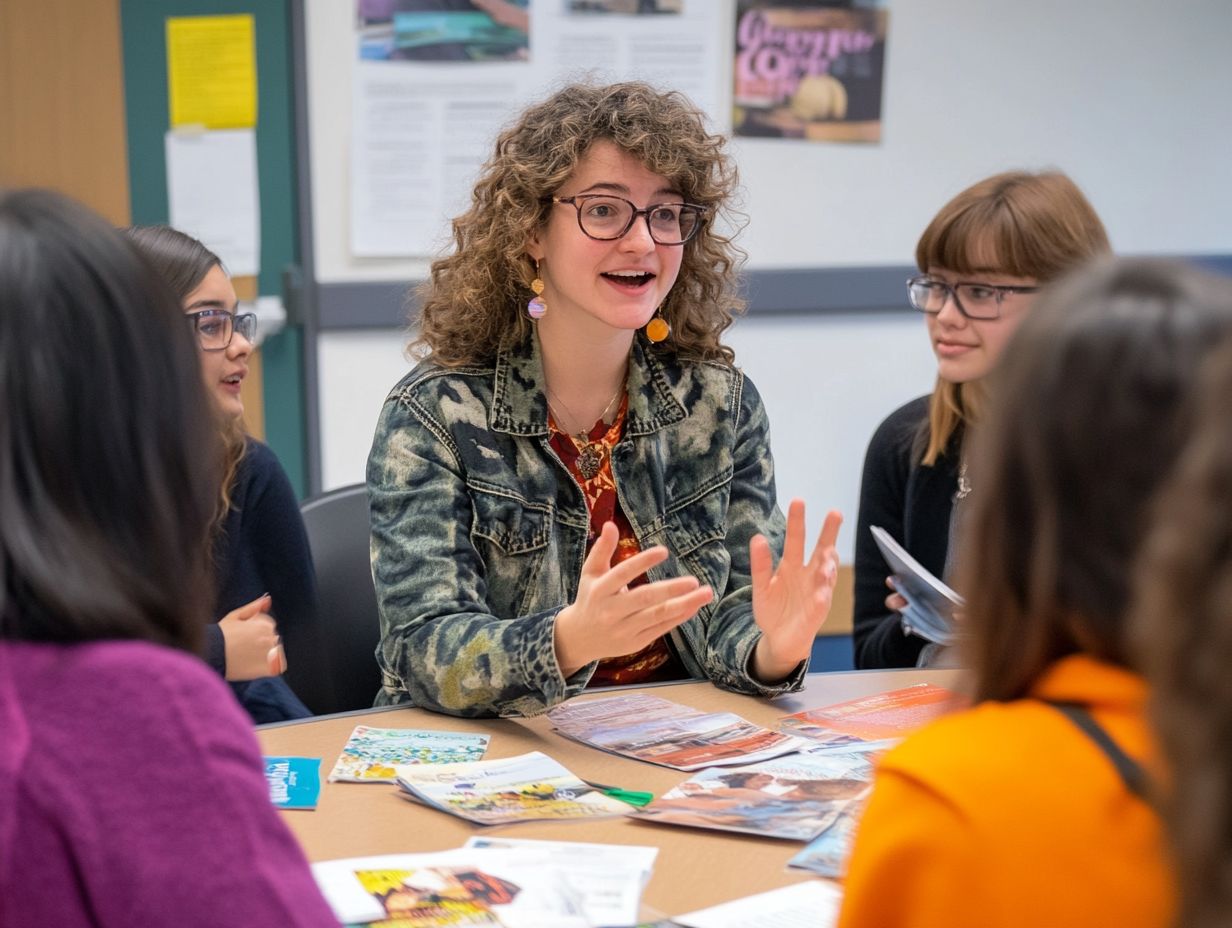
1. What is career guidance for students?
Career guidance for students is a process that helps students explore their interests, strengths, and skills to make informed decisions about their future career paths.
2. Why is career guidance important for students?
Career guidance is important for students because it helps them understand their potential and make informed decisions about their educational and career choices. It also helps them set realistic goals and develop necessary skills for their future careers.
3. Who provides career guidance for students?
Career guidance can be provided by school counselors, career coaches, or other professionals who specialize in helping students explore their career options and make informed decisions. Some schools also have career centers or resources available for students.
4. What are the benefits of career guidance for students?
Career guidance can help students gain a better understanding of themselves, their strengths and weaknesses, and their career interests. It can also provide them with necessary information and resources to make educated decisions about their future career paths.
5. When should students start seeking career guidance?
It is never too early for students to start seeking career guidance. It is recommended that students start exploring their career interests and options as early as middle school so they can have enough time to make informed decisions and develop necessary skills.
6. How can students prepare for career guidance sessions?
Students can prepare for career guidance sessions by thinking about their interests, strengths, and goals beforehand. They can also research potential career options and come up with questions to ask their career guidance counselor or coach during the session.
